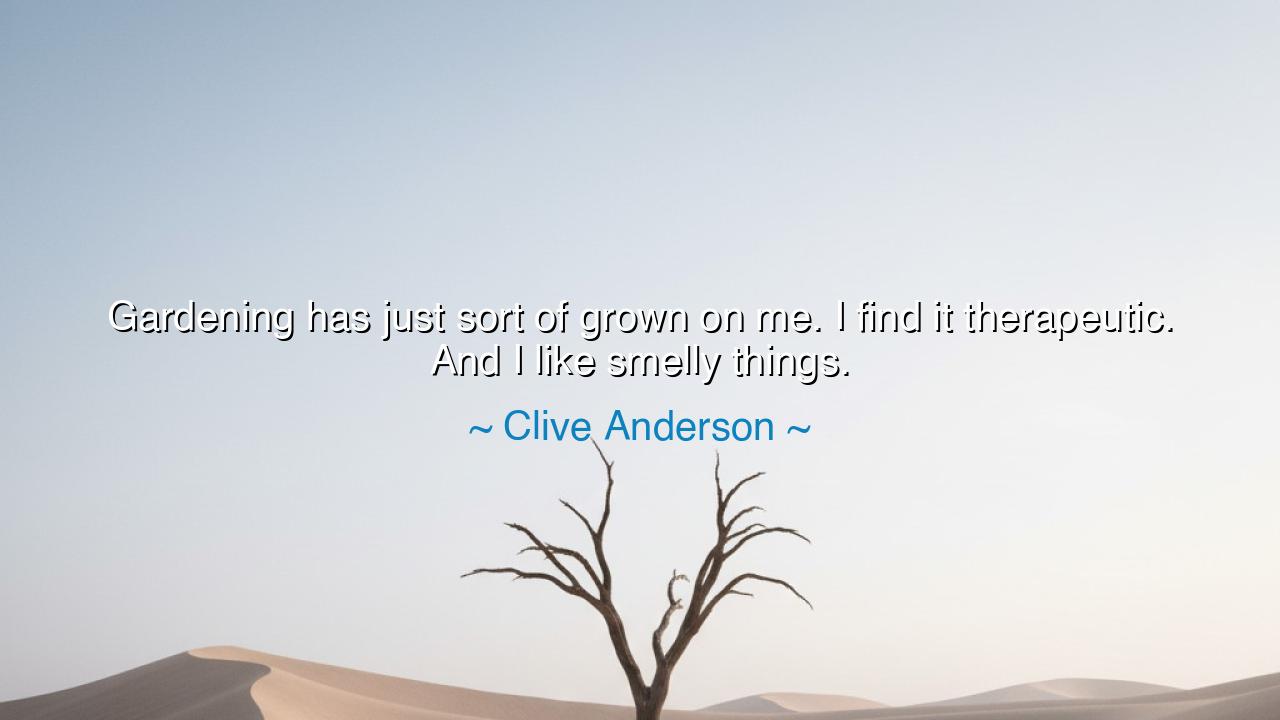
Gardening has just sort of grown on me. I find it therapeutic.
Gardening has just sort of grown on me. I find it therapeutic. And I like smelly things.






“Gardening has just sort of grown on me. I find it therapeutic. And I like smelly things.” Thus spoke Clive Anderson, a man known for his wit and sharpness of mind, yet in these words he reveals not the humor of the stage, but the gentleness of the heart. Behind his light tone rests a profound human truth: that gardening, though simple in act, possesses the quiet power to heal, to renew, and to draw the restless spirit back into harmony with the earth. His confession — that it “has grown on him” — is more than a clever turn of phrase; it is the story of transformation, the way that the soil itself teaches patience to the impatient and wonder to the weary.
The origin of this saying lies not in grand philosophy but in lived experience — the gradual awakening of affection that grows through the rhythm of tending life. Clive Anderson, a lawyer, comedian, and broadcaster, spent much of his life in words, debate, and performance — the bustling realm of intellect and competition. Yet, as happens to many who dwell long in the mind’s domain, the heart begins to yearn for something more tactile, more immediate, more human. In gardening, he found a refuge — a place where success is not measured by applause, but by growth; where the reward is not praise, but peace. His words speak to that awakening, that gentle rediscovery of balance between doing and being, between noise and silence.
To say that gardening is therapeutic is to recognize its sacred power to calm the spirit. In the turning of the soil, the planting of seeds, the pulling of weeds, one enters into communion with the eternal. The gardener does not rush — for the earth has its own time, and no command can hasten it. Through this patience, the restless heart learns to breathe again. The philosopher Epicurus, who tended his own small garden in ancient Greece, believed that happiness was found not in grandeur but in simplicity — in cultivating peace, friendship, and gratitude. The same spirit lives in Anderson’s reflection: the humble labor of gardening becomes a teacher of stillness, a medicine for the mind, a therapy for the soul.
And then there is his final confession: “I like smelly things.” At first glance, it may sound whimsical, but within it lies something deeply sensory and wise. For to love the scents of the earth — the fragrance of roses, the sharpness of mint, the sweetness of lavender, even the musk of soil after rain — is to love life in its rawest form. It is to awaken the senses from their slumber in a world dulled by screens and speed. Smell, that most ancient of senses, carries memory and emotion; it reminds us that we belong not to machines or abstractions, but to nature herself. To love the smells of the garden is to love the body’s dialogue with the living world — to rejoice again in being fully alive.
History too holds examples of such healing through the earth. The poet William Wordsworth, tormented by sorrow and solitude, found solace among the hills and gardens of the Lake District. He wrote of “the healing power of Nature,” where even the smallest flower could lift a weary mind toward peace. Likewise, after the horrors of war, soldiers returning home were often encouraged to garden — to rebuild their inner worlds through the steady rhythms of growth. The soil, it seemed, could absorb the pain that the heart could not bear. And so, from the battlefield to the backyard, gardening became not just a pastime, but a form of rebirth — a quiet therapy that binds the broken back to beauty.
There is a gentle irony in Anderson’s words that the ancients would have smiled upon. For the garden, once an emblem of toil and labor, becomes the very thing that restores joy. What begins as curiosity — a few pots of herbs, a rose bush, a patch of green — “grows on us,” until we realize that it is not we who shape the garden, but the garden that shapes us. In nurturing life, we ourselves are nurtured. Each act of care returns a harvest not only of flowers, but of humility, patience, and gratitude. The garden becomes a mirror of the self: when it thrives, we too are well; when it is neglected, so too is our peace.
Therefore, my child, take this lesson from Clive Anderson’s humble wisdom: seek not only the great cures of the mind, but the quiet ones. Let your hands touch the soil. Plant something small — a seed, a flower, a dream. Tend it daily, and let its slow growth remind you that not all healing is sudden. Find joy in the scents of life — in “smelly things” that bring you back to the senses, to presence, to gratitude. The world may spin with haste and noise, but the earth turns slowly, faithfully, beneath your feet.
For in the end, as Anderson discovered, gardening is more than pastime — it is a return to what is real. The garden does not demand brilliance or wealth; it asks only for attention. And in that giving of attention, we rediscover our wholeness. So let the garden grow on you, as it did on him, until its peace becomes your own — until you too find the therapy of the earth in the scent of rain, the bloom of a rose, and the quiet miracle of things that grow.






AAdministratorAdministrator
Welcome, honored guests. Please leave a comment, we will respond soon